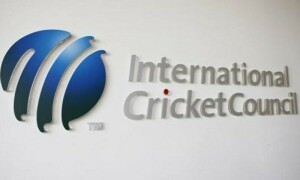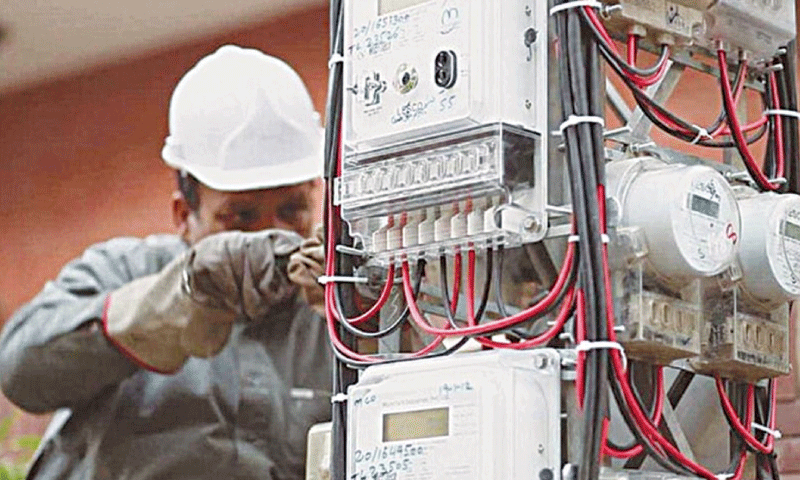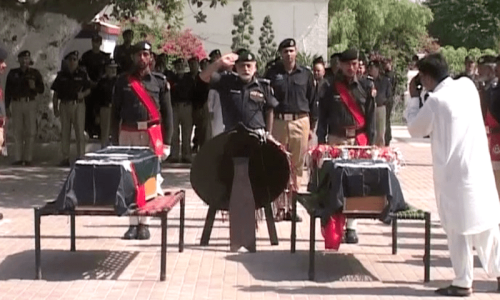RAMALLAH: One cold morning this week a group of two dozen protesters walked through Ramallah carrying flags and singing quietly as they reached the steps of the Palestinian parliament building. It was supposed to be a display of Palestinian unity, a gathering of MPs of all parties brought together in shared outrage at Israel’s devastating, week-long bombing of the Gaza Strip.
But such scenes of unity are rare and mask a reality that has become glaringly apparent to most Palestinians: the vast physical, political and social gulf that now divides the beleaguered Gaza Strip from the West Bank barely 20 miles away.
After lunchtime prayers on Jan 2 a much larger crowd gathered in Ramallah to protest, but it descended into fist fights between supporters of rival factions. Police fired into the air. Although there have been some street protests in the West Bank this week, they have been relatively few, less copious than the demonstrations in countries abroad. Instead, while there has been sympathy for the suffering of the Palestinian citizens of Gaza, there was also – from the president down – publicly voiced criticism of the strip’s rulers, the Islamist movement Hamas.
After the MPs’ march, Ibrahim Kharish, a senior Fatah official, spoke – with Al Jazeera’s live coverage of Gaza on the television above his desk – of his extraordinary anger at Hamas. “We should have courage enough to say that this could have been avoided and that actually Hamas led to this,” he said. “By taking our people and our land in Gaza under its control by force they are treating the people as hostages...Hamas is responsible for what is going on in Gaza, not only Israel.”
He said Hamas, under Iranian influence, was trying to isolate Gaza to set up its own miniature Islamic state and that it had vastly miscalculated what the Israeli reaction would be to a return to rocket fire from Gaza. “The people didn’t elect them to act like this,” Kharish said.
The Hamas-Fatah antagonism goes back years. They were at each other’s throats a decade ago, in effect fighting to lead the Palestinian national movement. Fatah won then, but its position gradually evaporated until it lost parliamentary elections in January 2006 to Hamas, with its preference for armed struggle over further negotiations with Israel. Within a year there was a near civil war on the streets of Gaza, one that claimed the lives of hundreds of Palestinians. It resulted in the better-organised Hamas routing Fatah and seizing full control of Gaza in June 2007 and left a bitter mutual hatred that months of mediation and talks have failed to calm. This week’s bombing of Gaza has widened, not narrowed, that gulf.
In the first hours after the bombing began, Mahmoud Abbas, the Palestinian president and Fatah leader, blamed Hamas for not extending a six-month ceasefire with Israel, even though it had been violated by both sides. When demonstrations were held in the West Bank on Sunday, the second day of the bombing campaign, anyone flying a Hamas flag was roughed up and arrested by Abbas’s security forces. That apparently produced such disquiet among younger Fatah ranks that Abbas has since moderated his words, calling for a ceasefire. On Thursday he even issued an order banning criticism of Hamas.
Hamas was quick to respond, accusing senior Fatah officials of collaborating with Israel by offering advice and intelligence for targeting the bombing. Some fear Abbas’s forces may yet ride back into power in Gaza graced by Israeli tanks.
It took an outsider to capture the depth of the crisis. “This terrible massacre would not have happened if the Palestinian people were united behind one leadership, speaking in one voice,” Saudi Arabia’s foreign minister, Prince Saud Al Faisal, said on Wednesday.
These concerns are reflected among the public, and this fragmentation between the two territories may account for the relatively subdued protests. There were demonstrations in Hebron, Ramallah and Nablus at the start of the bombing, but they have not been widely repeated. More demonstrations were held by Arab-Israelis in Israel, particularly in Haifa, Jaffa and Nazareth. The gathering in Ramallah on Friday was the largest of the week. There was also some sporadic stone throwing against Israeli police in east Jerusalem after lunchtime prayers.
In Gaza itself, with foreign journalists still banned, it remains impossible to gauge whether Hamas’s support has fallen or rebounded as a result of the bombing. Attitudes in Ramallah were mixed.
“Hamas made a mistake by entering politics,” said Naji Mourad, 31, who stood at a market stall in Ramallah. “They should give up their position and go back to armed resistance. It’s more honourable.” Others have little time for Hamas. “This is the involvement of Iran and Syria that we’re seeing in Gaza,” said Nasser Tubaisi, 34, who was out shopping for a mobile phone. “We’re not compassionate for Hamas – their leaders are all hiding. But we are compassionate for the people of Gaza.”
Those Palestinian figures who are neither members of Fatah nor Hamas tend to see the challenge most clearly. Qais Abdul Karim, a long-standing leftist MP, said he believed Israel’s bombing was intended to force on the Palestinians a provisional state, rather than true independence and sovereignty. “The idea is to isolate Gaza from the West Bank completely and to throw Gaza into the arms of Egypt and to subject the West Bank to perpetual domination by Israel,” he said. “Our priority must be to find a way to end our division.”
His concerns are not without foundation. Israelis speak openly of alternatives to a viable, independent, contiguous Palestinian state. In recent weeks Giora Eiland, a former head of Israel’s national security council, proposed Jordanian control over the West Bank or a multilateral land swap between Israel, the Palestinians and Egypt which would let Israel keep a large slice of the West Bank for itself and see Gaza slide closer to the reluctant embrace of the Egyptians.
Mustafa Barghouti, an independent MP who ran for the presidency at the last election, said Hamas and Fatah had been seduced into fighting over leadership of a largely powerless institution, the Palestinian National Authority – created under the Oslo accords a decade and a half ago and which gave the Palestinians the trappings of power without a state itself.
“The two sides were fighting for an authority that exists only in their minds, an elusive authority,” said Barghouti. “Now they see this authority is being destroyed by bombing in Gaza, and in the West Bank by an absence of credibility. Now everybody realises we are all targeted.
“I say to hell with this authority if it’s going to get us divided. We don’t need it. Let’s go back to a unified leadership. Now they are losing everything.”—Dawn/The Guardian News Service














































Dear visitor, the comments section is undergoing an overhaul and will return soon.